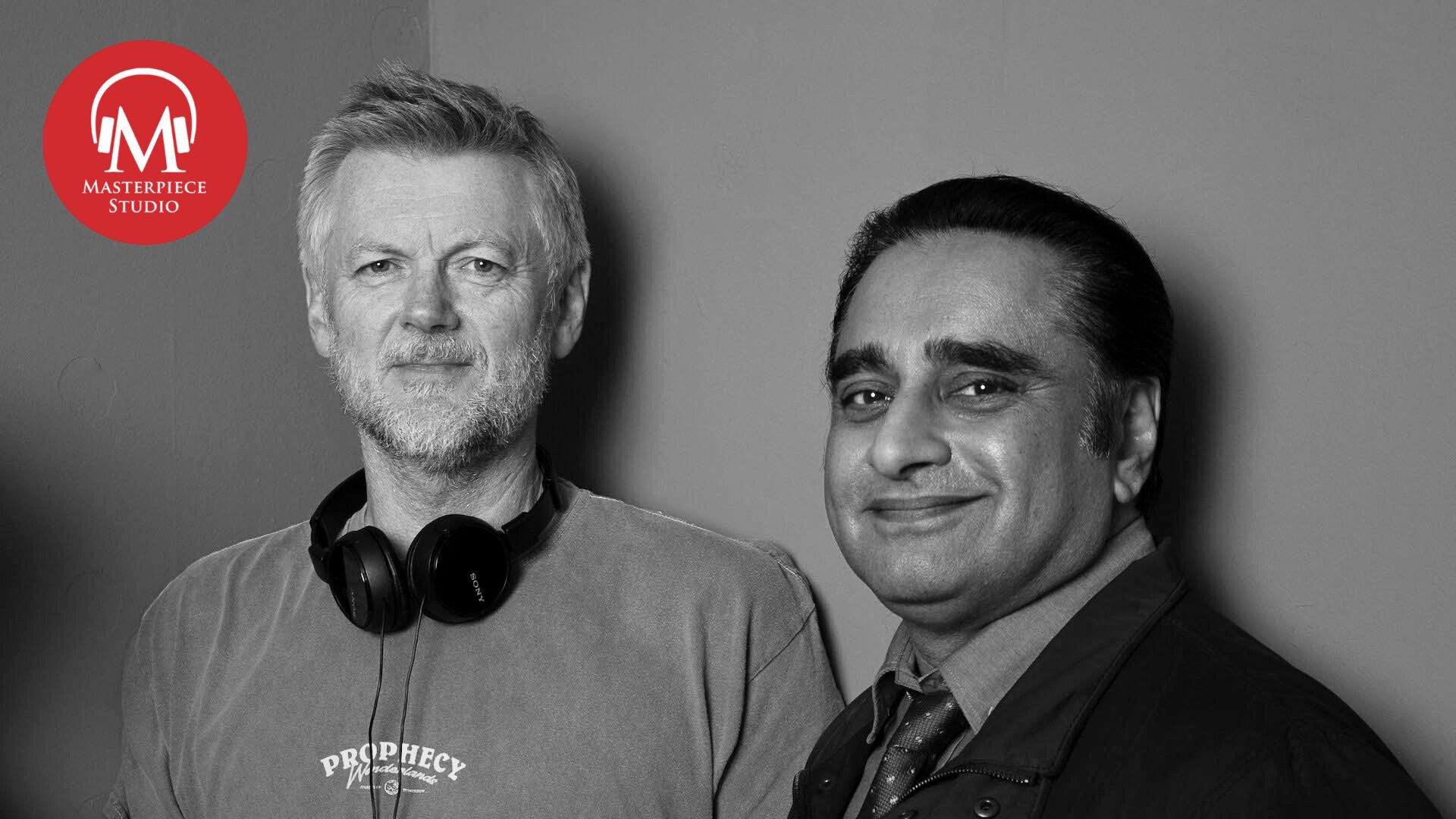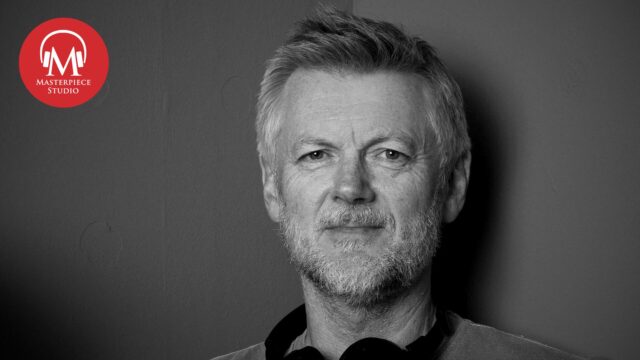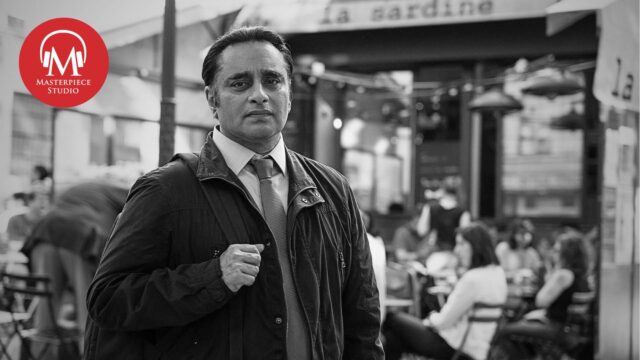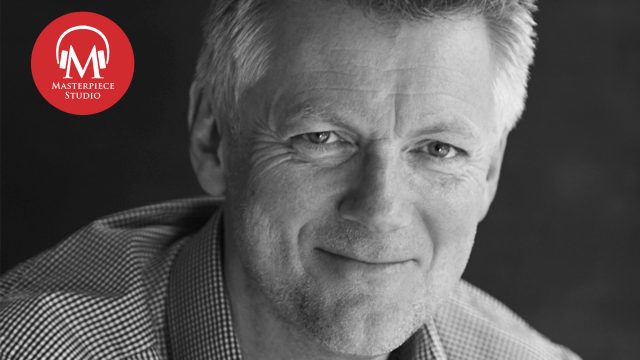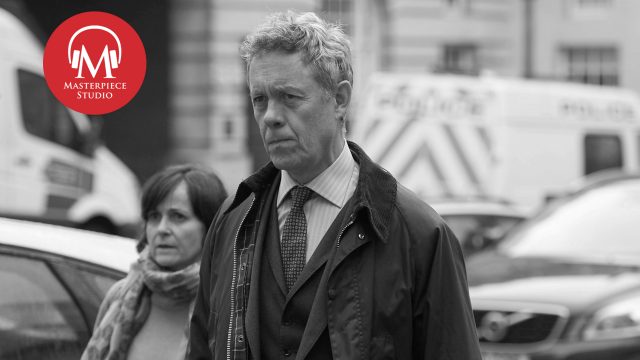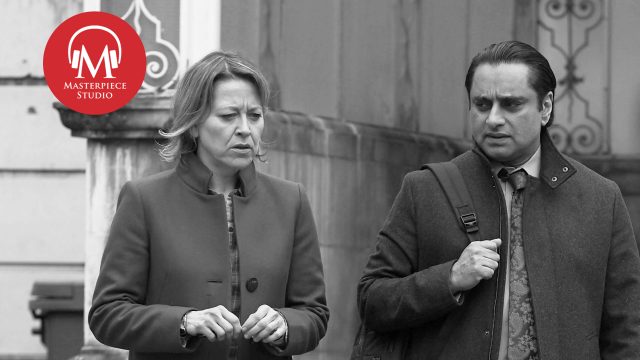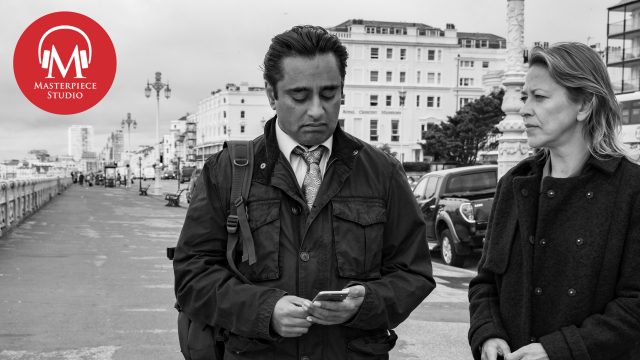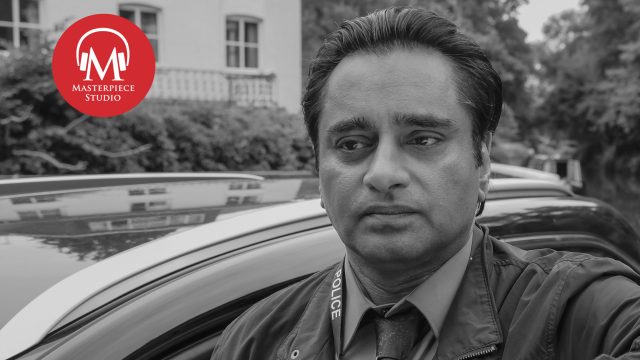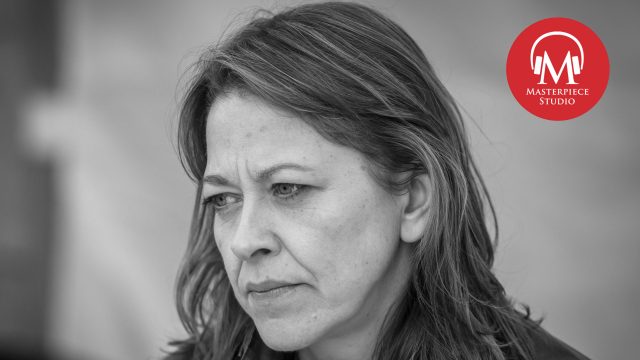This script has been lightly edited for clarity.
Jace Lacob: I’m Jace Lacob, and you’re listening to MASTERPIECE Studio.
We’re nearly at the end of Season 5 of Unforgotten, and yet there are still many unknowns. As the team continues to chip away at this Byzantine case, every little scrap of new evidence brings the overall narrative into focus.
CLIP
Sunny: And it is male?
Leanne: Looking at the brow ridge, the mastoid process, I’d say yes. And young.
Jess: Anything else jumping out?
Leanne: Aside from the two bullet shaped holes in his skull…
Jess: Apart from them?
Leanne: Not yet.
Sunny: This level of decomposition, might that suggest how long he’s been here for, roughly?
Leanne: If you mean could it have been around the same time as Precious Falade was killed, then yes, it’s not inconsistent.
Jess: Okay, thanks Leanne. DNA sample as soon as, please.
Now that DCI James and DI Khan have found a way to work together, the new partners are finally able to focus their crime-solving abilities on the case. And those abilities really shine through in this episode, particularly with DCI James’s razor-sharp interrogation tactics.
CLIP
Jess: Did you kill your granddaughter, Mr. Hume?
Hume: I don’t have a granddaughter. I have three grandsons.
Jess: I’m talking about Precious Falade.
Graham: What evidence do you have that Precious Falade is Mr. Hume’s granddaughter?
Jess: We can do DNA checks in time. But for now, I think his daughter, Ebele Falade, would confirm this. And if he denies that Ebele is his daughter, well then I simply ask why he’s been paying her money via standing order for the past 30 something years?
Hume: No, I didn’t kill her.
By the end of the episode, it’s clear that resolving this case was therapeutic not only for the parties directly involved, but also for the detectives solving it. Despite all of the changes this season, we’re left with a glimpse of hope for Sunny and Jess.
As Season 5 of Unforgotten zeros in on another satisfyingly unexpected conclusion, series lead Sanjeev Bhaskar and writer and creator Chris Lang join the podcast to reflect on this tumultuous season, and how even in the most difficult of situations, there is always the promise of new beginnings.
Jace Lacob: Once again, we are joined this week by Unforgotten star, Sanjeev Bhaskar. Welcome.
Sanjeev Bhaskar: Thank you very much Jace.
Jace Lacob: This season puts Sunny, or Sunny Calm as that sign in Paris calls him, through the ringer in more ways than one. It’s a really brutal arc for him overall. He does get a trip to Paris only to learn that Sal has miscarried, he’s grappling with grief and a lack of connection with Jessie. How difficult was this arc to live in as an actor?
Sanjeev Bhaskar: The main thing is, you feel very, very tired. I mean, that’s the one thing about grief and anxiety and all those things, it’s really tiring. The thing that makes it palatable is the environment and the people that you’re in. And you know, there’s that great quote from Maya Angelou that I kind of live by, she said that people may forget what you said, people may forget what you did, people will never forget the way you made them feel. And I think it’s absolutely true, good and bad. And the joy of doing Unforgotten, every series that we’ve done, including this one, are the memories are really, really positive. And so that comes from the people.
And so the extraordinary cast and extraordinary crew, they’re great fun. You feel supported, you feel like you’re part of a kind of family, if that’s not too much of a cliche. So yeah, every time I had any of those difficult scenes to do, once it had been nailed and they shouted cut, there was usually a joke at the end of it, laughter at the end of it.
And this was something that happened before between Nicola and I as well. Someone’s got bloopers of us coming around at probably the wrong times, but that makes it palatable. And something that my mother said actually about grief, which you know, Sunny is carrying so much of it in so many different ways across this series, and my mom said to me once, that grief is kind of coexisting with silly and funny and ridiculous and awesome. They’re all coexisting at the same time. It’s just that when we are in the depths of grief, we either forget that those other things are there, or we feel that we can’t reach for those.
And I think that it’s a great life lesson that my mom has given me. And I think that was really true on set, which was that even though Sunny was going through these things, and I was doing my best to convey those within the scenes, as soon as it finished, I knew I could reach for silly because it’s coexisting. It’s there as well.
I think that’s part of a well-rounded or healthy view of seeing your life is, is going, all those things, they’re all running parallel at the same time.
Jace Lacob: I love what your mom said. I’ve never thought about it that way. I think we could all learn from that. Sunny’s initial reaction to Sal’s pregnancy is perhaps not his finest moment.
CLIP
Sunny: And how do you feel about it?
Sal: Oh, um, yeah shocked obviously. A bit stupid for letting it happen.
Sunny: Don’t be daft.
Sal: But also a bit surprised I guess that I’m not definitely instinctively thinking I should have a termination.
Sunny: Okay.
Sal: Does that completely horrify you?
Sunny: No, no. Just, well, yes slightly. Sorry if that’s not what you want to hear. Better to be honest, I think.
Sal: Yeah, of course.
Sunny: And I mean, it’s my initial reaction. Obviously, I need to digest it.
Sal: Absolutely.
Sunny: And to mull. Both of us, I think.
Sal: Absolutely, yeah, let’s mull.
Jace Lacob: He has two daughters already. He thought he was past the child rearing years. What was your read on that scene and on Sunny’s reaction?
Sanjeev Bhaskar: It’s really awkward. It’s a really awkward scene and I think he knows what she wants to say. I think he can read between the lines, but he takes what she says at face value and runs with that a little too quickly. And you know, with those kinds of decisions, you react in the way you react. And then you either kind of think about it and reverse and apologize or whatever, or you double down on it.
And I think he is so lost that he doesn’t really know how to come back from that. And so, I think he’s kind of trapped by his reactions to it. And it’s not until much later that he finds a confidant to be able to express that to, and then not be judged for his thoughts, that he begins to kind of emerge from it.
But I think it’s genuinely, and again, because I think Chris Lang writes emotional honesty, I thought it was a very emotionally honest scene, that awkwardness when two people want perhaps two different things, but don’t express that quite as clearly as they’d like. And then you’re kind of trapped by your own response. It was a fantastic scene to play, but it was really awkward. And yeah, I’m sure I made a joke at the end of it.
Jace Lacob: You mentioned confidants. I love the scene in episode three between Sunny and Dr. Balcombe over coffee.
CLIP
Sunny: And if she did do it deliberately…
Leanne: She didn’t do it deliberately.
Sunny: Why didn’t I see it? Why didn’t I do more to help her?
Leanne: Cassie’s death was not your fault, Sunny. It was just life. Random, cruel life. Did you talk to Sal about this?
Sunny: No.
Leanne: Do you think maybe you should? To someone?
Sunny: No, she finds it hard enough as it is. I know she thinks I should’ve gotten over it by now. I know everyone does.
Leanne: I don’t. I think about her too. All the time. It still absolutely winds me. So, if you don’t want to see someone about it, talk to me. I’ll always listen, I’m always here.
Jace Lacob: It’s such a beautiful moment of friendship between Sunny and Leanne, who were the last two people to see Cassie alive. Were you surprised by this scene when you first read the script for this episode?
Sanjeev Bhaskar: I was surprised and delighted that it was in. I was not surprised at the scene itself because as you say, they were the last two people to see Cassie alive. And that bonds them. And also, as far as the audience is concerned, and I think probably as far as Sunny’s concerned, this is the first person that he has spoken to about it and has listened, because everything else is about the job. It’s about work. It’s kind of, sure, you can say a nice thing, but you’ve got a job to do.
You come in at whatever it is, 8:30 or 9:00 AM and you work till 6:00 or 7:00, and within that time, it’s going to be about the job. And so, this was the first time that somebody had broached the subject, I think. So, in that sense, it was an important scene. It was important for Sunny. So yeah, I was delighted it was there.
Jace Lacob: Sal ends up losing the baby. In episode four, the two of them finally do sit down. “It’s hard to feel jealous of a dead woman,” Sal says, “…but I do.” Nine months they’ve been engaged. There’s still not a wedding date. You and Michelle Bonnard are both so, so great here. What is Sunny actually feeling at this point, and how difficult was it to capture that in this scene, this very emotional scene?
Sanjeev Bhaskar: Yeah, again, it’s incredibly well written and Michelle is fantastic and she’s great fun. So, trying to reach what they were reaching for, I think, again, you go for honesty. And those really difficult emotional conversations where you have to be honest, you cannot be strategizing, are really difficult because as empathetic people, you don’t want the other person to be upset, you don’t want them to get angry, you don’t want them to misunderstand. And so, you’re playing these mental gymnastics with words and phrases and pauses because you think that the truth, the unvarnished raw truth may be too painful. But sometimes that’s the right thing to do.
Sal has a line which he says, the cruelest thing is, that’s the most that you’ve said to me in months. And because he admits to being lost. So yeah, it was pin drop silence on the set. There may have been 20 people there, but you couldn’t hear anybody breathing. It was a good scene to do because I think it was honest. And I think that for me, I just had to access something that was really, really honest in that moment about myself as well, and try to convey that.
One of the difficulties with scenes like that is that if you kind of play-act it too much, you press the melodrama button and then you’re worried about how you’re coming across.
Jace Lacob: Sunny and Jess finally have it out in episode four, “I can’t work like this next to you, but not with you.” To which Jess says, “I can’t be her.” But then Sunny does what he hasn’t so far, and he tells Jess everything, Sal, the miscarriage, all of it, and she does the same, and she tells him what’s been going on with her marriage. How does this one scene alter the very fraught dynamic between these two colleagues?
Sanjeev Bhaskar: That’s one of my favorite scenes that I’ve done in any of the series, actually. I think it’s a really beautifully written scene. Within that one scene, you go from two people on opposite sides of the fence to two people who climb onto the fence, then talk to two people who end up on the same side of the fence. And it was just so beautifully measured across that not very long scene. Again, it’s suddenly, it’s the point where they both decide that there is a greater good and that is kind of solving this case. And so, what do we do to do that? They reset. They reset and they both know that the only way they’re truly going to reset is by not playing games. And the way to get around that again, is to be honest, is cards on the table.
And then the other person can behave and respond in whatever way they want, but they both arrive at that point at the same time, fortunately. It would’ve been terrible if one of them had arrived at that point and the other one hadn’t.
But I think that was the beauty of that, was that suddenly you strip away all the kind of antagonism they’ve had towards each other. They both kind of realized that it’s been other things at play. Sunny starts off by saying, look, I haven’t been at my best. And she says, you’re not seeing me at my best either. And then once they talk about why, they kind of go, great, we can move on.
Jace Lacob: They’ve been stripped down. They’ve lost these foundations of their respective lives and can finally sort of admit this. And they’re finally able through this honesty to forge a new bond. Given how closely you worked with Nicola, how did it feel to reach this moment with Sinéad?
Sanjeev Bhaskar: It was really lovely. It was really lovely. We knew it was coming because it was in the script, but the playing of it is so different. And Nicola and Sinéad both have very different energies as actors and on set. Both of them brilliant in their own ways. You shoot things out of order as well. I think the fact that Sinéad and I kind of had this conversation before we started, that was really helpful. The fact that we were on set, and we have a similar sense of humor that really helped.
It was just fantastic to get to that point. And I don’t know how their relationship is going to develop. I just know it will, and it won’t be the same as Sunny and Cassie. It’s a new person, but they will get on. But the tonality between them, how Chris reads that and sees that, I’m really excited to see.
Jace Lacob: Sunny and Jess do get Tony Hume. Jess says, “You will only ever be remembered as a rapist who murdered his own great grandson.” We leave Sunny and Jess as they head out to a bar joking about Jessie James and holding up a bar.
CLIP
Sunny: That’s a 57-year-old crime DCI James. A Bishop Street record.
Jess: For now. And it’s , please.
Sunny: Jessie James. So, you ever held up a stagecoach?
Jess: Held up a bar.
Sunny: Well, now you’re talking.
Jess: I’ll get my horse.
Jace Lacob: Is this the beginning, perhaps, of a beautiful friendship?
Sanjeev Bhaskar: Yeah, in that moment, I think that what Chris showed was that Jess is much more opinionated and front footed than Cassie was. Cassie would never have done that in an interview situation. She would’ve gone, okay, we’ve resolved the thing, have we brought justice to the right people, now go and drink red wine. Whereas Jess was more, let me just let this out before I leave the room.
In terms of the last line and holding up a bar, I mean, the beautiful friendship line I think it’s an apt one. Because it is a little bit like Humphrey Bogart at the end of Casablanca.
Jace Lacob: Yeah.
Sanjeev Bhaskar: If we’d been outside and we’d been on an airfield and it’d been a little misty, that would’ve worked perfectly. I would’ve been Bogart. She would’ve had to have been Claude Rains. I’d just insist on that. But yeah, I think it was Chris’s way of saying, yeah, they’ve connected.
Jace Lacob: So, it is 2023. Rishi Sunak is PM. Yet, it’s striking to me how few programs there still are with Asian leads, much less detective dramas. Your wife, Meera’s BAFTA speech earlier this year dedicated to “All my fellow travelers, all the ones who’ve been made to feel because of their race, sex or class, that their stories don’t matter.” struck at this as well. Do you see DI Sunny Kahn and your upcoming Inspector Singh helping to shift that needle?
Sanjeev Bhaskar: Yeah, one always lives in hope. The first series that I ever did was Goodness Gracious Me, which was a comedy sketcher. And I remember that time, this was 1998, and people said then, do you think this will kind of open the doors? And I said, well, I certainly hope so, because the more stories we have, the better it’s going to be, the more reflective of the world that we live in, it will be. And it kind of didn’t. And that’s been a huge shame that it hasn’t.
And I think that for me, always, people are very quick to kind of pigeonhole ideas and, and even art. Movies become chick flicks and this appeals to, you know. I went to see Barbie the other day, and all the buildup to it was, well, this is going to appeal to little girls or women who were once little girls. And I thought it was great. I thought it was a fabulous film and I really enjoyed it.
And I think the difficulty is, while we still focus on ‘the other’, those can never be our stories. And so whether it’s Barbie or whether it’s Unforgotten, whether it’s Sunny Khan, whether it’s Jessie James, as in Jess James, your way into it is by saying, those are all our stories. Once you go, it’s their story, it’s someone else’s story. Well, that comes from a different country, so that’s not my story. Well, that’s a different gender, so that’s not my story. It’s a different age, it’s not my story. Then what the heck are you going to be watching? You’re going to be just watching stuff with yourself in it. And again, then you’re not living in the world and it’s really myopic, living in a room with a single mirror that you’re staring at.
And so, in that sense, do these characters, will these characters kind of open doors? I hope so. I hope so, because I think that it would mean that those people who will come in through that open door will tell their stories and those will be our stories.
Because at the end of the day, primarily I’m a viewer. I view more than I act, and I want to see great stuff. I want to see great stuff. I want to see those original stories. I want to see those little kinds of peep holes into a way of thinking or a way of living that I haven’t experienced or haven’t thought about. If I just keep seeing the same world that I know over and over again just reinforced, I don’t know where my growth is going to come from.
Jace Lacob: Sanjeev Bhaskar, always a pleasure. Thank you so very much.
Sanjeev Bhaskar: Likewise, Jace. Thank you.
We’ll take a quick break to hear a word from our sponsors, and when we return, we’ll speak with Unforgotten creator Chris Lang.
MIDROLL
Jace Lacob: And we are back, uh, with Unforgotten creator Chris Lang to dissect episode six of season five. Welcome back.
Chris Lang: Thank you.
Jace Lacob: Unforgotten never disappoints in terms of its resolution or its many plot twists. In this case, it’s that Jay is not Joseph Bell, but his unknown half-brother who was kept out of the system. Precious killed Joseph. Tony Hume raped Ebele’s mother and buried Joseph in his daughter’s garden. Chris Lang, how do you come up with these twists?
Chris Lang: They’re often quite late. The final twist is often quite late because you’re always looking to, how can you twist it one more time. You’re playing with the audience’s suspicions all the time and you’re constantly trying to think about what would surprise them. But not for the sake of it. I never like doing tricksy things. It has to be real. It has to be rooted in the truth of the characters’ lives, their backstories and everything they’ve done or that we’ve seen them do or know about what they’ve done over the course of the episodes.
And I thought this was absolutely right organically, that this man, Tony Hume was in the end undone by a lie, given that his whole life and career and political philosophy was predicated on deceit and lies. I thought that was right and neat. And also, that he accepts it. It’s a small penance to pay for a dying man who’s probably only going to spend six months in prison before he succumbs to his cancer. He confesses to something he didn’t do because he knows that he did dreadful things, that in the end caused the chain of events to occur that led to the deaths of two people. So, he knows he’s kind of morally responsible for it, and so takes responsibility for it, even though he didn’t actually pull the trigger as it were.
Jace Lacob: It is an ending to me that reminded me, on a thematic level, of the ending of series two, that there’s a difference between capital “J” Justice and lowercase “j” justice. And in this case, we do see that justice has been served, that he can go away on this lie, but what he’s actually being punished for is the other crimes. When, during the process of breaking series five, did you realize that Hume dying, though he may be, would go down for the crime he didn’t commit?
Chris Lang: Yeah, as I said, late. I’d submitted a draft where he had done it. And we all felt it was good, but it felt, well, the word that we keep coming back to is ‘surprise’. And it felt slightly unsurprising. And so, I went away and just thought again about what I was really trying to say, and then it came to me and it was actually not a difficult rewrite.
But that’s often the way, I think. Sometimes plotting stories like this, it’s very complicated and knotty and you have to get quite a lot of it down on the page to free your mind then to go to the next level. So, it’s quite normal. I think it’s happened two or three times over the course of five seasons where I’ve got it all down and I’ve got to the end and I’ve said, this is the person that did it. And then that gives you the head space and the air to go away and think, is there anything else I can add to this? Is there anything else that I can twist? Is there any surprise that I can deliver that is organic and right and truthful, but which subverts expectations? I think it would be hard to create those right from the beginning because you are wrestling with so many other things as well.
Jace Lacob: Ebele confronts Haley Mills’s Emma, at the Hume Estate.
CLIP
Ebele: You screwed multiple generations of my family over, and then think it’s okay because I got some money.
Emma: I didn’t screw anyone over.
Ebele: Maybe not as directly as him. But your privilege, your comfort, your happiness, this house in fact, were all built on the bones of people like me. Weren’t they?
Emma: I’d like you to leave now, please.
Ebele: You knew what he did, didn’t you? You knew the policies that he espoused for decades. You knew the millions of lives that he ruined, mine included. And you did nothing. You just looked the other way. So, I didn’t really come to speak to you, but now I’m here. Screw you, too. I loathe the pair of you.
Jace Lacob: My God, what a scene. This is a blistering denunciation of privilege, austerity, conservative policy. Where did the idea for this showdown come from between Ebele and Emma?
Chris Lang: Well, I guess that’s as near as dammit to the pitch of the whole series, how privilege, historical privilege, and class suppress through entrenched systems, people like her and have done for hundreds of years and how it’s still happening now. I didn’t want her necessarily to have the showdown with him because he was on the journey of understanding. She isn’t at all. She has made no forward movement, which I thought was quite interesting. Tony Hume at least understands the tragedy that he’s witnessed, which he knows he was largely responsible for. He’s sort of had a slight Damascene moment and has in the last six years tried to change his life a bit.
But she hasn’t at all. She’s always been sort of protected and cloistered from the privilege and the life she’s led. So, I thought it was much more interesting to have those two go at each other and two women of a similar, I mean, Ebele is a bit younger, but just to have her go at Haley’s character and tell it as it is. And that was me really venting on behalf of that community.
And you get the sense that a little bit of it actually manages to get across that incredibly thick skin of privilege, which is like a rhino hide. Because no one of that generation or that class wants to hear that or wants to believe that they’ve been astonishingly lucky and that they started a hundred yards in front of everyone else in life. They don’t want to hear it. So yeah, that was me venting.
Jace Lacob: What does she finally get to achieve by unleashing and venting her anger on Emma? Does she finally come to grips with the trauma that she has inherited, or the system that is embodied by these two people?
Chris Lang: Well, I think she does to a degree, but it’s just a moment in time. The life she has led and the life she will go on to lead are all products of that systemic privilege or the lack of it in her case. So, she says her piece, and I’m sure that was cathartic for her, but she still has to live her life with all of that damage inside her. For me, the key moment is when she meets her grandson in the last scene. And I always want to try and end these shows with a glimmer of hope. And you get the sense that if she can rebuild that relationship, then they can both begin to rebuild and grow something better out of their very fractured lives.
CLIP
Ebele: Are you Jay?
Jay: Yes.
Ebele: Do you know who I am?
Jay: I think so.
Ebele: I’m your nan, Jay. Ebele.
Jay: Hello, Nan.
Chris Lang: I always loved the line, “Hello, Nan.” because he’d not ever been able to say that and the idea that he can say that finally. And family and love are so important in the healthy development of an individual. And particularly for kids that have come out of care, to be surrounded by some representation of love and some representation of family, is incalculably important. And he has that finally at the end. And he says those words, “Hello, Nan.” And you think, yeah, they’re going to make a go of it. They’ve reconnected and hopefully they can move more forward together. I think that’s really, really important.
Jace Lacob: I love that scene so much. I love the beautiful simplicity of it, and I love the fact that this might be a show about murder, but Unforgotten is actually quite an optimistic show. I do see them being able to move into the future together and changing as a result of this, and hopefully creating this new bond between the two of them. Which is really beautifully optimistic, as I say.
Chris Lang: It is, and it has to be. You can’t just write these stories and never give optimism. And the optimism and the answers are always really simple. They’re love, and family and support, when you’re vulnerable through the state. And so going right back to your first question, these are the two themes that we’re talking about. These are the themes, you know, generational damage, and here we have it with the potential of being healed. And if we can also heal our political system and realize that if you just keep stripping funding out of every support system in a country, you will cause damage and pain.
And if we make it better for the vulnerable in our society, we make it better for everyone. We all benefit. And it’s a political philosophy that has almost entirely vanished from the UK’s political system in the last 10, 15 years. And it’s deeply, deeply tragic.
Jace Lacob: The final scene of Series five finds Sunny and Jess in a good place, even celebratory over a Bishop Street record for solving a historical crime. “And it’s Jessie, please, Jessie James.” They even exchange a laugh as they head out, maybe even to a pub together, possibly. Have these two finally put their ghosts to rest? Can they actually start a proper partnership now?
Chris Lang: Yeah. I think the respect is absolutely going to grow. And the humor, the sense of humor, I think they share that. And they will laugh with each other, and they will work really well together. But there is a distance between them, which will be interesting, which will be different to how things were before as well, again, with Cassie.
Jace Lacob: And Unforgotten is not the only Chris Lang we’ve gotten recently. I thoroughly enjoyed your other recent True Crime drama, The Thief, His Wife and the Canoe. What is next for you?
Chris Lang: I am writing a new show which will also shoot next year about the fallout from a will of a man, a working class Northern industrialist who dies in the first episode and it’s about his extended family’s fight for the spoils. And that I am currently writing.
Jace Lacob: Very exciting. I can’t wait to see that. Chris Lang, thank you so very much.
Chris Lang: Thank you Jace. Lovely to speak to you as always.
Another cold case solved, justice delivered, and an unexpected partnership beginning to blossom. As we say goodbye to this season of Unforgotten, we turn our attention next to a brand-new season of the World War II drama, World on Fire. It’s been three years in the making, and we couldn’t be more excited.
CLIP
Robina: Jan! How long have you been here?
Jan: Only since…midnight.
Robina: Please try to exercise a little self-restraint.
Jan: But I am excited!
Robina: Yes. I’ve always regarded excitement as the gateway to hysteria, and nobody wants that.
(Knocks on door)
The Season 2 premiere of World on Fire begins Sunday, October 15th on MASTERPIECE on PBS.








